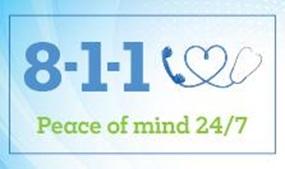Emergency Department Wait Times
If you have a life-threatening crisis or urgent condition, call 9-1-1 or go to the nearest Emergency Department immediately.
Examples of urgent medical conditions include:
- discomfort or tightness in the chest,
- unusual shortness of breath,
- abdominal pain,
- a prolonged and persistent headache or dizziness,
- an injury that may require stitches or may involve a broken bone,
- prolonged diarrhea or vomiting (especially in a child), or
- a fever of 38°C or 100.4°F, or higher (especially in a baby under six months).
PEI Emergency Departments
Select the hospital below for its current estimated wait times.
Wait times are posted for information purposes only. If you need urgent care, always go to the hospital closest to you.
Location |
Facility |
Address |
Hours |
| Charlottetown | Queen Elizabeth Hospital | 60 Riverside Drive | 24 Hours |
| Summerside | Prince County Hospital | 65 Roy Boates Ave. | 24 Hours |
| Montague | Kings County Memorial Hospital | 409 MacIntyre Ave. | See the wait times page for current hours of operation. |
| Alberton | Western Hospital | 148 Poplar St. | See the wait times page for current hours of operation. |
You may need to wait longer than the wait time posted when you arrive at the emergency department to see a physician.
Emergency department wait times are an estimate of how long it will take to see a physician from the time you register with the emergency department.
People with the most critical conditions are seen first. This means people who arrive after you may be seen before you.
How soon you see a physician depends on:
- how critical your condition is,
- how many people are in the waiting room, and
- how critical their conditions are.
Wait times update every five minutes; however, they can change rapidly, without notice.
The estimated wait time for each level of urgency is the longest current expected wait time for patients assessed at that level of urgency currently in the waiting room.
If your medical condition is non-urgent:
- Call your family doctor or nurse practitioner.
- If you do not have a family doctor or nurse practitioner, visit a walk-in clinic; or, if you're registered for virtual health care, book an appointment online with Maple.
- You can also access a number of specialty services without a physician's referral. See Find Health Care.
If you are unsure about what to do:
Call 8-1-1 to speak with a registered nurse, 24 hours a day, seven days a week.
Frequently Asked Questions
What should I bring to the emergency department? |
|
Bring the following:
|
What will happen when I arrive at the emergency department? |
|
A staff member will register you as a patient. A triage nurse will then:
Based on this, the nurse will assign you a triage level. All Canadian health care facilities use the same standards to determine the seriousness of a person’s illness.
Depending on your triage level, you may be taken to a treatment room at once or asked to wait in the waiting room. |
Will I be seen within the posted wait time? |
|
You may need to wait longer than the estimated wait time as the demand for emergency medical attention can change quickly. In an emergency department, people who are the most critical, life-threatening health conditions are cared for first. People who arrive after you may receive medical attention before you. You can not always tell how critical a person’s condition is by looking at them. While waiting, if you have questions or feel your condition has become worse, let the triage nurse know right away. |
What can I expect in the treatment area? |
|
A member of the health care team will do a more thorough assessment of your condition. Depending on your condition, the emergency department physician may discuss treatment options and make any follow-up arrangements, prescriptions, or necessary referrals. You may also be referred to a consulting physician or a specialist who will decide whether you need to be admitted to hospital. |
What if I leave before being treated? |
| Do not leave without being seen by a physician. Should you decide to leave without being treated, let the triage nurse know. |
What if the patient does not speak English? |
| Language interpretation services are available for patients who do not speak English. This service is offered to newcomer, immigrant, and Francophone patients and families. |


